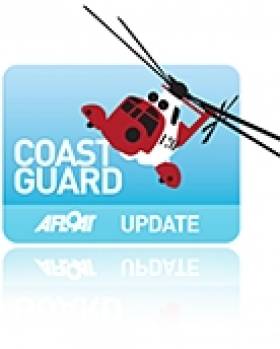Displaying items by tag: Search and Rescue
Helicopter Crew Commended For Dramatic Air-Sea Rescue
The crew of an emergency search and rescue helicopter has been awarded the Best of Irish Award for rescuing a stricken pilot when his light aircraft crashed into the Irish Sea.
The six-strong crew of R117, employed by CHC Helicopter and based at Waterford, was presented with the accolade at the awards which took place at the Burlington Hotel in Dublin last night.
The star-studded ceremony, which also saw the Irish Rugby team recognised for their outstanding win at the 2009 RBS Six Nations tournament, celebrates those who have excelled in the past year and contributed in a positive way to the people of Ireland.
Captain Dara Fitzpatrick, co-pilot Ronan Flanagan, winch operator Neville Murphy and winchman Keith Devaney were all present to collect the award. The remaining members of the team, engineers Martin Dennehy and Colm McCloughry, were unable to attend.
“We are delighted and honoured to have been presented with this award which is really the cherry on the cake for us,” said Capt Fitzpatrick.
“When you hear a report of an aircraft ditching in the sea you immediately think worst-case scenario. We didn’t know what we were facing so to have been able to retrieve a casualty alive from the water was fantastic.”
The team was returning from a training exercise when they were alerted to a mayday call at around 5pm on August 11, last year.
The crew the British Orchid Atlantic rowing boat, who were navigating round Britain, called the Coast Guard after seeing an aircraft crash into the water at Tuskar Rock, off the South Wexford coast.
Low on fuel, the S61 rescue helicopter quickly landed, refuelled and was on route to the scene within 10 minutes. As they made their way to the location, reports were received of wreckage in the water and a suspected survivor.
On arrival, they saw the pilot standing waist-deep in water on the wing of the stricken craft which was rapidly succumbing to the waves. Winchman Keith Devaney was lowered down and was able to secure the man and winch him to safety moments before the single-engine aircraft sank.
The sole occupant of the plane, which was being flown from England to Wexford, the pilot was flown to shore and taken by ambulance to hospital. Despite his ordeal, he had miraculously escaped serious injury.
“In terms of technical challenges we have had to deal with some far tougher jobs,” added Capt Fitzpatrick.
“We were fortunate that the conditions were relatively calm and that the pilot hadn’t suffered any serious injuries on impact. Combined with the extensive mission training we undergo, these factors made for a textbook rescue.”
Chris Reynolds, Director of the Irish Coast Guard said: “I am pleased to see the men and women of the Irish Coast Guard recognised for their professionalism. The service operates 365 days a year in all types of conditions and this award is testament to the continued hard work, training and commitment of the whole team.”
Noel Dempsey, Ireland’s Minister for Transport, also praised the team for their heroic efforts.
“I warmly congratulate the Waterford Coast Guard helicopter crew, for a very well-deserved award,” he said.
“The speed at which they responded to this incident, assessed the scene and acted, certainly helped save a life. But this award isn't just for the crew on the Waterford helicopter that day though.
“It's for all of their backroom team, including the engineers who ensure that our aircrafts are safe to fly, our replacement crews, and everyone who supports the work of the Waterford team, and all our other teams around the country.
“Each day hundreds of Coast Guard crews, whether in lifeboats, helicopters or involved in our other patrols around the coastline, selflessly put their lives at risk in the service of others.
“I want to commend you all and thank you, on behalf of the Government for your role in this important, lifesaving work. Well done again.”





























































